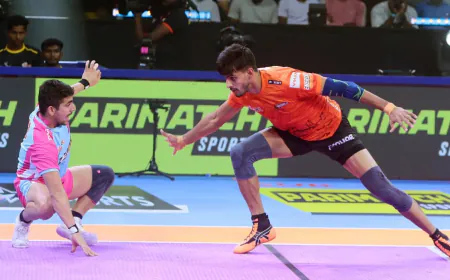PCB Restructures Selection Panel: Captains and Coaches Removed
Background of Selection Committee Changes The recent shakeup in the selection committee follows a trend seen in various cricket boards globally, where the emphasis is shifting towards a more structured approach in team selection, often involving former players and experts who can provide insights based on performance metrics and current form rather than solely relying on captain and coach recommendations. Historically, the inclusion of team captains and head coaches in selection committees has been seen as a double-edged sword. While it allows for firsthand insights into player capabilities and team dynamics, it can also lead to conflicts of interest, particularly when selections are made based on personal biases or recent performances that may not reflect a player's overall ability.

In a significant shift in the Pakistan cricket selection landscape, the Pakistan Cricket Board (PCB) has decided to remove the captains and head coaches of the national Test and limited-overs teams from the men’s national selection committee. This decision comes in the wake of a recent overhaul of the panel that had previously included these roles.
The move follows Pakistan's disappointing defeat by an innings and 47 runs to England in the first Test held in Multan. In response to the loss, the PCB had earlier announced the induction of Aleem Dar, Aaqib Javed, and Azhar Ali into the selection committee. This newly formed panel had included not only the captains and head coaches of the respective teams but also Asad Shafiq, Hasan Cheema, and various PCB officials. However, the latest changes have resulted in a more streamlined selection committee comprising only five members: Dar, Javed, Ali, Shafiq, and Cheema. The other previous members have been removed from the PCB’s official website list of selectors.
This decision comes shortly after Shan Masood and Jason Gillespie, the head coach of the Test team, expressed their support for Babar Azam, the former captain, to retain his position in the side despite his recent struggles with form. Masood specifically mentioned his willingness to continue backing Azam after the batsman's underwhelming scores of 30 and 5 during the first Test, which was played on a relatively favorable batting surface.
Despite this backing, Azam was dropped from the squad just two days before the start of the second Test. This decision followed an extensive discussion involving the selection committee, Masood, Gillespie, and Usman Wahla, the PCB's director for international cricket operations, during one of Pakistan's training sessions.
The new selection panel has already started to receive positive feedback due to their effective changes, which led to standout performances from debutant Kamran Ghulam and recalled off-spinner Sajid Khan. Ghulam made a spectacular debut, scoring a century, while Khan returned to the team after being overlooked for the two Tests against Bangladesh, claiming seven wickets in an innings, which marked the best figures for a bowler in Tests at Multan.
The primary focus for the newly constituted selection committee will now be to announce the squads for the One Day Internationals (ODIs) and T20 matches scheduled to take place in Australia next month. The upcoming tour presents a crucial opportunity for the selectors to assess player performance and adaptability in challenging conditions.
Background of Selection Committee Changes
The recent shakeup in the selection committee follows a trend seen in various cricket boards globally, where the emphasis is shifting towards a more structured approach in team selection, often involving former players and experts who can provide insights based on performance metrics and current form rather than solely relying on captain and coach recommendations.
Historically, the inclusion of team captains and head coaches in selection committees has been seen as a double-edged sword. While it allows for firsthand insights into player capabilities and team dynamics, it can also lead to conflicts of interest, particularly when selections are made based on personal biases or recent performances that may not reflect a player's overall ability.
The PCB’s decision to strip these roles from the selection committee indicates a desire to foster an environment where selection is based on merit and performance rather than sentiment or previous associations. This shift also aligns with global trends in cricket, where boards are increasingly relying on data-driven analysis and expert opinions to guide their selections.
Implications of the Changes
The implications of this decision are significant. For the players, it may foster a sense of meritocracy, where selections are based purely on current form and fitness rather than historical reputations or past contributions. This can motivate players to perform consistently, knowing that their positions are earned rather than assumed.
For the new selectors, the challenge will be to balance the expectations of fans and the media while also maintaining the integrity of the selection process. The recent performances by Ghulam and Khan provide a solid foundation for the new panel, but they will need to build on this success by continuing to identify and nurture talent that can perform at the international level.
The upcoming Australian tour will also serve as a litmus test for the selectors. Given Australia’s challenging home conditions and the fierce competitiveness of their national team, the selected squad will need to exhibit resilience and adaptability. The choices made by the selection committee will be under scrutiny, particularly if the results do not meet expectations.
As the PCB moves forward with its restructured selection panel, the focus will be on restoring the team’s competitive edge and ensuring that only the best players represent Pakistan. The decision to remove captains and head coaches from the selection committee is a bold step towards achieving a more merit-based selection process.
The upcoming ODI and T20 series in Australia will be critical for both the players and the selectors, as they seek to prove that the recent changes can lead to improved performances on the international stage. With a fresh approach and a renewed focus on performance, the PCB is looking to reinvigorate Pakistan cricket as they prepare for the challenges ahead.




















































